PEN and Turkey—In Prison
by Tarık Günersel / March 1, 2013 / 2 Comments
For writers, journalists or any “thinking person” in Turkey free speech is increasingly difficult.
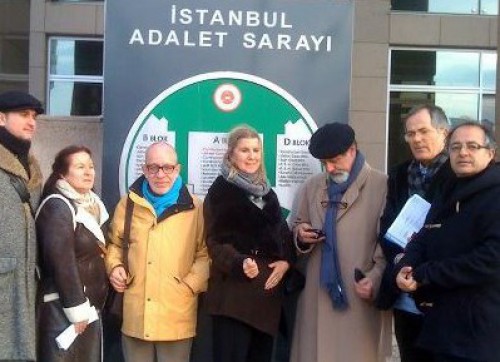
Members of the board of PEN Turkey after police questioned their support of Turkish pianist Fazil Say. All photos provided by Tarık
Born in London in 1921, PEN International (Poets, Essayists, Novelists) is an organization that promotes literature and freedom of expression around the world. It is made up of a federation of PEN Clubs—with 20 thousand members in 144 centers from 102 countries, including Turkey—and one of its logos is a sphere of letters from 43 alphabets. What follows in this column are several cases that PEN has been involved with in Turkey, though the issues that the organization addresses in my country are important for anyone, anywhere.

- Life is words in action, literature is action in words.
Humans are about to destroy their spaceship Earth. Some of them are aware of this and they try to change the course of events. Will they succeed? Will more humans be alarmed and do something?
Literature is vital and translators are messengers of world peace.
Though I shall focus on the literary scene in Turkey and its problems regarding freedom of expression, I shall not omit the other parts of our planet. Today local is global and vice versa. 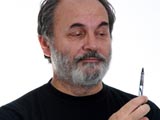
- Tarık Günersel is a poet, playwright, aphorist, librettist and short story writer. He is the president of PEN Turkey and an ex-member of the PEN International Board. He studied English Literature at Istanbul University. A self-exile after the military coup in 1980, he spent four years in Saudi Arabia with his wife Füsun and their daughter Barış, teaching English. A dramaturg at Istanbul City Theater since 1991, he has acted on stage and screen and directed some of his plays. He proposed World Poetry Day in 1997 which was accepted by PEN International and declared by UNESCO as the 21st of March. His translations into Turkish include works by Samuel Beckett, Vaclav Havel and Arthur Miller. His works include The Nightmare of a Labyrinth (mosaic of poems and stories), and How’s your slavery goin’? His Oluşmak (To Become), a “life guide for myself,” includes ideas from world wisdom of the past four millennia.
For example, secularism is vital for freedom of expression. But during the past few years, the secular dimension of Turkey has been weakening. A number of journalists, politicians, and high-ranking army officials have been in prison for years without conviction. Some are in prison accused of preparing a military coup (the so-called Ergenekon case) and some are in prison for their supposed involvement with the Kurdish Communities Union (KCK)—an organization connected to the outlawed Kurdish Worker’s Party (PKK). Below are a few of those who are currently incarcerated.
Arrested in September 2008 and March 2009 respectively, journalist Tuncay Özkan and PEN member Mustafa Balbay are two of the many journalists who remain in prison without conviction. They have been incarcerated for more than four years, as a result of the ongoing Ergenekon trial.
In December 2009 Muharrem Erbey was among 80 people who were arrested on accusation of having links with the KCK, or “membership of an illegal organization.” Erbey is the Director of the Diyarbakir Branch of the Human Rights Association, a Kurdish writer, and a respected human rights lawyer. He has been in prison for three years in connection with the ongoing KCK trial.
Charged in June 2012, internationally renowned composer and pianist Fazil Say has been accused of “religious defamation” due to tweets he posted and re-tweeted. PEN International and English PEN Centre have recently sent appeals to Turkey’s Ministry of Justice on his behalf.
Based on these cases both PEN International and PEN Turkey have taken many steps to address freedom of speech in the country and call for democratization. What follows is a description of some of our actions.
In November 2012, a delegation led by PEN International President John Ralston Saul visited my country; as the president of PEN Turkey I also took part in the delegation. On November 12, President Abdullah Gül welcomed us and a carefully prepared file of cases along with an official statement from PEN International was presented to President Gül, who expressed his concern about the current problems.
The delegation also visited the EU Minister Egemen Bağış in the capital, Ankara. Then on November 15, Writers in Prison Day, PEN International held a press conference in Istanbul, criticizing the worsening situation in Turkey and inviting the government to democratization.
PEN International President John Ralston Saul, PEN International Vice-President Eugene Schoulgin, PEN International Secretary Hori Takeaki, PEN Writers in Prison Committee (WiPC) International Chair Marian Botsford Fraser, PEN International Treasurer Eric Lax, and myself all attended the press conference. Larry Siems of the PEN America Center is not in the photo but was also present in the Ankara meetings with President Gül and EU Minister Bağış.
Additionally, PEN International Deputy Director Sara Whyatt is not pictured, but it must be said that over the last twenty years she has been in charge of the professional work that has helped thousands of writers and journalists in prison worldwide.
The PEN International delegation’s visit made a huge impact in Turkey. I am sure its positive effects have contributed to efforts of democratization. Not only writers and journalists, but also all of Turkey’s democrats owe the delegation a lot. As PEN Turkey, we are in contact with PEN International and the concerned members of several sister PEN Centers.
Nevertheless, on December 25, a police officer visited the PEN Turkey office in Istanbul and asked for our board members’ home addresses. Because of the statements of solidarity we made in defense of the composer and pianist Fazil Say on June 3, we were accused of breaking the law—Article 301 of the Turkish Penal Code, to be precise—and an investigation had been initiated.
So on January 10, PEN Turkey’s members gave their statements to the authorities. In the photo to the right are: Poet and PEN website editor Nihat Ateş; short story writer and Treasurer Tülin Dursun; novelist Mario Levi; IPI Award Winner, journalist, and essayist Zeynep Oral; writer and International Secretary Prof. Dr. Ahmet Erözenci; novelist and lawyer General Secretary Sabri Kuşkonmaz; and novelist and Vice-President Halil İbrahim Özcan. All of them were questioned one-by-one. I was also on the list, but since I was in Philadelphia for family reasons, I sent my statement through the Turkish Consulate in New York.
Beside all of these cases, which PEN Turkey has defended and have brought repercussions for its members, there is one other case affecting a writer who was awarded by our organization: She is Pinar Selek. Selek is a sociologist, novelist,and has been acquitted three times in more than a decade—she once spent two and a half years in prison. Recently though Selek has been sentenced to life imprisonment, causing protests not only in Turkey, but also internationally.
Selek is accused of planting a bomb that caused the deaths of seven people and injured more than a hundred, though the investigators have repeatedly declared that the explosion was not caused by a bomb, but by a gas leak.
Currently in France, after staying in Germany on a German PEN Scholarship, Selek hopes that this injustice will be corrected.
And so do we.
Because at present, Turkey is still a wonderful country for tourists, but it is becoming an increasingly difficult place for its citizens. You wouldn’t want to be a writer, journalist, translator, publisher, human rights activist, democrat, thinking person, or anyone who seeks justice in “my” country. Even John Steinbeck’s Of Mice and Men is one of the books found “harmful” by certain authorities in the Turkish education system, and many journalists have lost their jobs due to the anger of Prime Minister Recep Tayyip Erdoğan, who seems to hate being criticized.
But it would be defeatism to say that history has ended. If, as they say, “the show must go on,” then so must the struggle for a secular and democratic world.
And that’s not possible without international solidarity. Thank you for your concern. For even sparing your time to read this. We’re on the same planet.

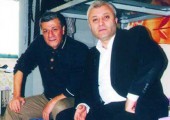
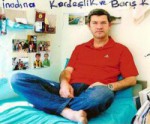
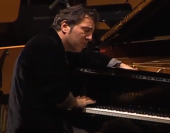


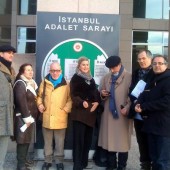
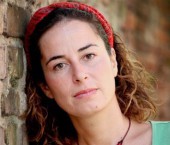




2 Comments on "PEN and Turkey—In Prison"
Tarik Gunersel and the other members of PEN Turkey deserve broad international support for the courage and openness with which they face the difficulties for writers posed by the current regime. It seems that Turkey’s growing lack of interest in EU membership makes the government bold about ignoring values promoted there and elsewhere in countries where freedom of speech is seen as essential to good governance. PEN New Zealand is one among many who support their sister organisation in Turkey.
thank you PEN for bringing light to our world, and for helping to erase borders between people. I had always wanted to work on behalf of PEN, since becoming a member of Reader’s International book series in college. I realize that they are probably unrelated but to me they are linked, as publishers for writers who were living behind an Iron curtain or under a dictatorship, as a voice for the disappeared. I read Monika Maron from East Germany, Lu Wenfu from China, Ezekiel M’phthalele from South Africa and many others through RI. I had a friend who worked at PEN in New York at one time as an admin assistant, Michael Teig.